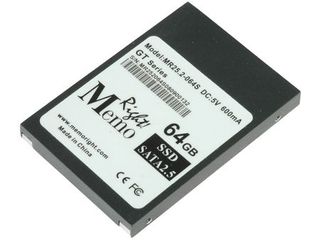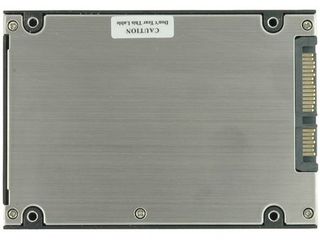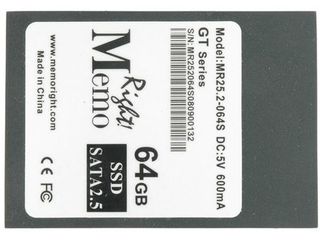Will SSDs Take Over The Enterprise?
MemoRight Flash SSD MR25.2-064S
When we first reviewed this flash SSD, we received a 32 GB model for testing. This time we obtained eight of the 64 GB models, which provide decent capacity for high-end systems. While the flash SSDs cannot be deployed into professional SAS environments dual ports are necessary, the SATA interface is at least still fast enough to not become a bottleneck.

Cool and Quick
There is not much to say about these drives in this regard, as they do not have a cache memory and they aren’t even very sensitive to high temperatures. While conventional hard drives are typically validated for operation at up to 55°C or 60°C, flash SSDs can withstand at least 70°C. Industrial drives may be operated in environments of up to 80°C, but the MemoRight SSDs require little cooling anyway.
As for performance, the access time of 0.1 ms measured by the h2benchw 3.6 benchmark, as well as a constant 114 MB/s read throughput and 104 MB/s writes, speak for themselves—this despite the fact that the SATA 1.5 Gb/s interface offers only 125 MB/s bandwidth. In this case, the bandwidth equals the maximum throughput, as there is no drive cache memory to read from.
MemoRight also wins the I/O benchmarks by a significant margin, and dominates the Windows XP startup benchmark of PCMark05. However, it does not win PCMark’s file write benchmark, where the Cheetah 15K.5 delivers better sequential write performance.
We are looking forward to studying the results for eight of these drives in RAID.


Stay on the Cutting Edge
Join the experts who read Tom's Hardware for the inside track on enthusiast PC tech news — and have for over 25 years. We'll send breaking news and in-depth reviews of CPUs, GPUs, AI, maker hardware and more straight to your inbox.
Current page: MemoRight Flash SSD MR25.2-064S
Prev Page The Future of High-Performance Enterprise Storage Belongs to Flash Next Page Seagate Savvio 10K.2, 2.5” SAS at 10,000 RPMMost Popular

